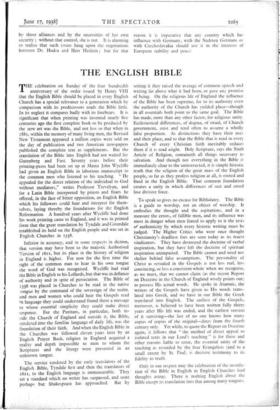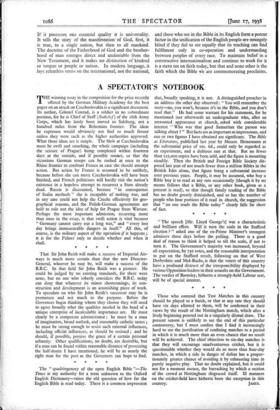THE ENGLISH BIBLE
THE celebration on Sunday of the four hundredth anniversary of the order issued by Henry VIII that the English Bible should be placed in every English Church has a special relevance to a generation which by comparison with its predecessors reads the Bible little. In its neglect it compares badly with its forebears. It is significant that when printing was invented nearly five centuries ago the first complete book to be produced by the new art was the Bible, and not less so that when in 1881, within the memory of many living men, the Revised New Testament appeared a million copies were sold on the day of publication and two American newspapers published the complete text as supplements. But the translation of the Bible into English had not waited for Gutenberg and Fust. Seventy years before their printing-press had been set up at Mainz John Wycliffe had given an English Bible in laborious manuscript to the common men who listened to his teaching. " He appealed for the direct relation of the individual to God without mediators," writes Professor Trevelyan, and for a Latin Bible interpreted by priests and friars he offered, in the face of bitter opposition, an English Bible which his followers could hear and interpret for them- selves, laying thereby the foundations for the English Reformation. A hundred years after Wycliffe had done his work printing came to England, and it was in printed form that the great translation by Tyndale and Coverdale established its hold on the English people and was set in English Churches in 1538.
Inferior in accuracy, and in some respects in diction, that version may have been to the majestic Authorised Version of 1611, but its place in the history of religion in England is, higher. For now for the first time the right of the common man to hear in his own tongue the word of God was recognised. Wycliffe had read the Bible in English to his Lollards, but that was in defiance of authority and in spite of persecution. The Bible of 1538 was placed in Churches to be read in the native tongue by the command of the sovereign of the realm. and men and women who could hear the Gospels read in language they could understand found there a message to whose essential simplicity they could make direct response. For the Puritans, in particular, both in- side the Church of England and outside it, the Bible, rendered into the familiar language of daily life, was the foundation of their faith. And when the English Bible in the Churches was followed eleven years later by an English Prayer Book, religion in England acquired a reality and depth impossible to men to whom the Scriptures and the liturgy were presented in an unknown tongue.
The service rendered by the early translators of the English Bible, Tyndale first and then the translators of 1611, to the English language is immeasurable. They set a standard which no writer has surpassed, and none perhaps but Shakespeare has approached. But by setting it they raised the average of common speech and writing far above what it had been, or gave any promise of being. On the religious life of England the influence of the Bible has been supreme, for to its authority even the authority of the Church has yielded place—though in all essentials both point to the same goal. The Bible has made, more than any other factor, for religious unity. Ecclesiastical differences, of dogma, of ritual, of Church government, exist and tend often to assume a wholly false proportion. As distinctions they have their uses and their place, and to that the Bible that is read in every Church of every Christian faith inevitably reduces them if it is read aright. Holy Scripture, says the Sixth Article of Religion, containeth all things necessary to salvation. And though not everything in the Bible is immediately clear to the uninstructed, it is simple historic truth that the religion of the great mass of the English people, so far as they profess religion at all, is rooted and fixed in the English Bible. That common foundation creates a unity in which differences of sect and creed lose divisive force.
To speak so gives no excuse for Bibliolatry. The Bible is a guide to worship, not an object of worship. It embodies the thought and the aspirations, and in a measure the errors, of fallible men, and its influence was most in danger when men feared to apply to it the tests of authenticity by which every historic writing must be judged. The Higher Critics who were once thought Christianity's deadliest foes are seen today as its truest vindicators. They have destroyed the doctrine of verbal inspiration, but they have left the doctrine of spiritual inspiration unimpaired. The Bible cannot and need not shelter behind false assumptions. The' personality of Christ as revealed in the Gospels is not less real, less convincing, or less a consistent whole when we recognise, as we must, that we cannot claim (as the recent Report on Doctrine in the Church of England wisely points out) to possess His actual words. He spoke in Aramaic, the writers of the Gospels have given us His words trans- lated into Greek, and we have in our Bible the Greek translated into English. The earliest of the Gospels, moreover, is believed to have been written fully thirty years after His life was ended, and the earliest version of it surviving—the last of no one knows how many copies of copies of the original—dates from the fourth century only. Yet while, to quote the Report on Doctrine again, it follows that " the method of direct appeal to isolated texts in our Lord's teaching " is for these and other reasons liable to error, the essential unity of the teaching as recorded by the four Evangelists (and to a small extent by St. Paul) is decisive testimony to its fidelity to truth.
Only in one respect may the celebration of the installa- tion of the Bible in English in English Churches lead thoughts astray. There is nothing English about the Bible except its translation into that among many tongues. If it possesses one essential quality it is universality. It tells the story of - the manifestation 'of God, first, it is true, to a single nation, but then to all mankind. The doctrine of the Fatherhood of God and the brother- hood of man emerges direct and undeniable from the New Testament, and it makes no distinction of kindred or tongue or people or nation. In modern language, it lays relentless stress on the international; not the national, and those who see in the Bible in its English form a potent faCtor in theunification of the' F.nOislipeople are strangely blind if they fail to see equally that its teaching can find fulfilment only in co-operation and understanding between peoples of every race. To maintain belief in a constructive internationalism and continue to work for it is a stern tax on faith today, but that and none other is the faith which the 'Bible We are commemorating proclaims.



















































 Previous page
Previous page